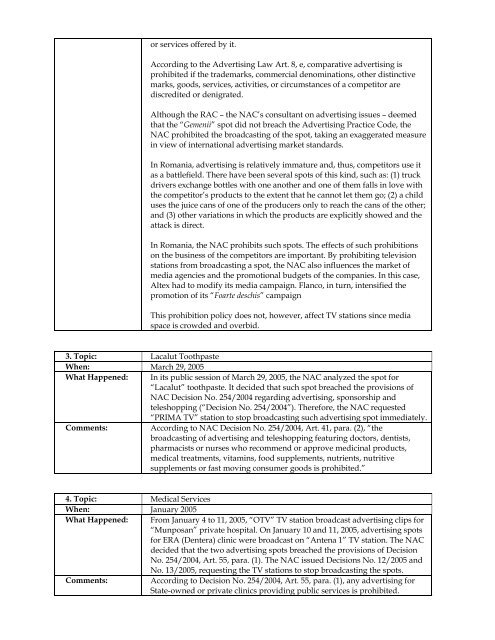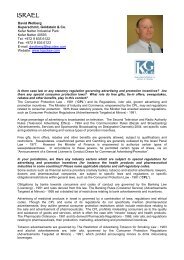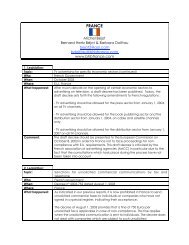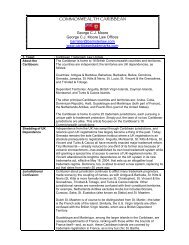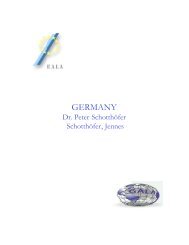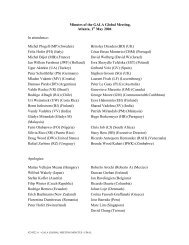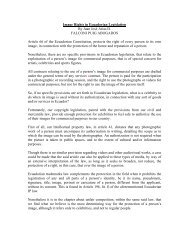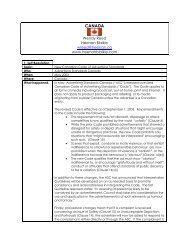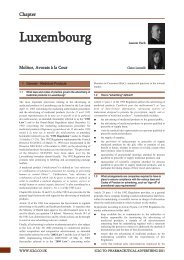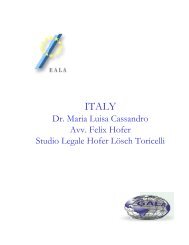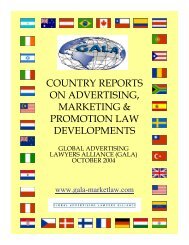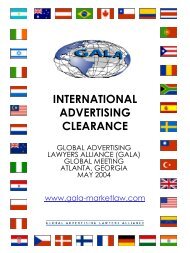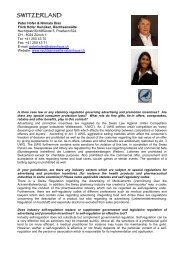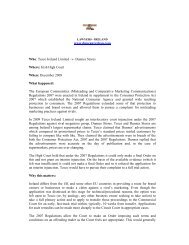list of contributors - GALA
list of contributors - GALA
list of contributors - GALA
Create successful ePaper yourself
Turn your PDF publications into a flip-book with our unique Google optimized e-Paper software.
or services <strong>of</strong>fered by it.<br />
According to the Advertising Law Art. 8, e, comparative advertising is<br />
prohibited if the trademarks, commercial denominations, other distinctive<br />
marks, goods, services, activities, or circumstances <strong>of</strong> a competitor are<br />
discredited or denigrated.<br />
Although the RAC – the NAC’s consultant on advertising issues – deemed<br />
that the “Gemenii” spot did not breach the Advertising Practice Code, the<br />
NAC prohibited the broadcasting <strong>of</strong> the spot, taking an exaggerated measure<br />
in view <strong>of</strong> international advertising market standards.<br />
In Romania, advertising is relatively immature and, thus, competitors use it<br />
as a battlefield. There have been several spots <strong>of</strong> this kind, such as: (1) truck<br />
drivers exchange bottles with one another and one <strong>of</strong> them falls in love with<br />
the competitor’s products to the extent that he cannot let them go; (2) a child<br />
uses the juice cans <strong>of</strong> one <strong>of</strong> the producers only to reach the cans <strong>of</strong> the other;<br />
and (3) other variations in which the products are explicitly showed and the<br />
attack is direct.<br />
In Romania, the NAC prohibits such spots. The effects <strong>of</strong> such prohibitions<br />
on the business <strong>of</strong> the competitors are important. By prohibiting television<br />
stations from broadcasting a spot, the NAC also influences the market <strong>of</strong><br />
media agencies and the promotional budgets <strong>of</strong> the companies. In this case,<br />
Altex had to modify its media campaign. Flanco, in turn, intensified the<br />
promotion <strong>of</strong> its “Foarte deschis” campaign<br />
This prohibition policy does not, however, affect TV stations since media<br />
space is crowded and overbid.<br />
3. Topic: Lacalut Toothpaste<br />
When: March 29, 2005<br />
What Happened: In its public session <strong>of</strong> March 29, 2005, the NAC analyzed the spot for<br />
“Lacalut” toothpaste. It decided that such spot breached the provisions <strong>of</strong><br />
NAC Decision No. 254/2004 regarding advertising, sponsorship and<br />
teleshopping (“Decision No. 254/2004”). Therefore, the NAC requested<br />
“PRIMA TV” station to stop broadcasting such advertising spot immediately.<br />
Comments: According to NAC Decision No. 254/2004, Art. 41, para. (2), “the<br />
broadcasting <strong>of</strong> advertising and teleshopping featuring doctors, dentists,<br />
pharmacists or nurses who recommend or approve medicinal products,<br />
medical treatments, vitamins, food supplements, nutrients, nutritive<br />
supplements or fast moving consumer goods is prohibited.”<br />
4. Topic: Medical Services<br />
When: January 2005<br />
What Happened: From January 4 to 11, 2005, “OTV” TV station broadcast advertising clips for<br />
“Munposan” private hospital. On January 10 and 11, 2005, advertising spots<br />
for ERA (Dentera) clinic were broadcast on “Antena 1” TV station. The NAC<br />
decided that the two advertising spots breached the provisions <strong>of</strong> Decision<br />
No. 254/2004, Art. 55, para. (1). The NAC issued Decisions No. 12/2005 and<br />
No. 13/2005, requesting the TV stations to stop broadcasting the spots.<br />
Comments: According to Decision No. 254/2004, Art. 55, para. (1), any advertising for<br />
State-owned or private clinics providing public services is prohibited.


